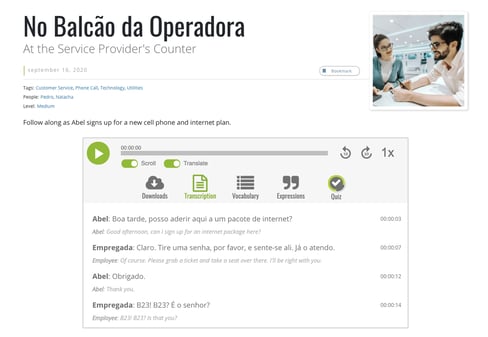 To become a permanent resident or citizen of Portugal, you may need to pass a level A2 Portuguese language test. This ensures that you have enough proficiency with the language to communicate at a basic level in the country.
To become a permanent resident or citizen of Portugal, you may need to pass a level A2 Portuguese language test. This ensures that you have enough proficiency with the language to communicate at a basic level in the country.
The name of the A2 proficiency exam is CIPLE: Certificado Inicial de Português Língua EstrangeiraInitial Certificate of Portuguese as a Foreign Language .
The organization that produces the CIPLE is called CAPLE: Centro de Avaliação de Português Língua EstrangeiraPortuguese as a Foreign Language Evaluation Center .
CAPLE’s purpose is to assess and characterize proficiency in the Portuguese language. They use 6 levels: A1, A2, B1, B2, C1, C2, which are based on the QECR: Quadro Europeu Comum de ReferênciaCommon European Framework of Reference of languages.
Now that we got all those acronyms out of the way 😅 , the important thing to know is just that CIPLE is the certificate for adults to prove they have met A2 level proficiency in Portuguese. (There is also a more basic test for the A1 level, but it is intended for those ages 12-15.)
Note: We are not affiliated with CAPLE or AIMA or the Portuguese government. We’re just here to teach you European Portuguese! This post is intended to provide general information, links, and tips for studying, but we are not involved in administering tests or determining residency/citizenship. To find out what’s required for your situation, contact AIMA (formerly SEF), which is the immigration agency in Portugal.
Structure of the CIPLE Exam
The A2 Portuguese language test is about 2 hours long and is divided into 3 components:
1. Compreensão da Leitura e Produção e Interação EscritasReading Comprehension and Written Production and Interaction

- Reading Comprehension: This part includes reading short texts such as ads, notices, etc and completing multiple choice, matching, and true/false questions.
- Written Production: You will also be asked to write short messages, such as text messages, emails, and/or letters.
2. Compreensão do OralListening(Oral) Comprehension
- You will listen to audio of informal texts related to public, professional, or educational contexts.
- The clips may include background noise and will typically be played over a speaker to the whole room, not on headphones.
- You’ll complete a multiple choice, matching, and true/false questions based on the audio.
3. Produção e Interação OraisOral Production and Interaction
- This part usually involves 2 test-takers speaking with the examiner at the same time.
- You may discuss basic personal information, describe pictures, and/or roleplay situations that you could encounter in the real world.
CIPLE Exam Scoring
There will be limited time to complete each section, so it’s important to be able to read/listen, understand, and respond quickly. To pass, you must score at least a 55% to show that you have reached a “suficiente” level on the A2 Portuguese language test.
How to Study
 Structured Lessons
Structured Lessons
At Practice Portuguese, the Units cover A1 up through B2 grammar concepts. Members can start by learning the basics and work up to more advanced grammar concepts through these fun, online lessons.
Completing the Learning Notes and Lessons within each Unit is a great way to get started on your path to A2 level proficiency, and beyond!
The A1 and A2 series of Units cover the most essential components of the language, which is quite a lot of information! You’ll start with simple greetings and work all the way up to topics such as using prepositions and conjugating verbs in the imperative mood.
B1 and B2 continues building on what you’ve learned, so that you can handle more complex interactions. These levels cover the conjuntivo (subjunctive mood), past participles, idiomatic language, personal infinitive, specialized vocabulary, and much more. Even though the CIPLE tests for A2 proficiency, the topics and skills that are associated with this level are quite subjective, so we recommend working past the A2 level if you want to feel more comfortable and confident. That way you will at least have some familiarity with other aspects of Portuguese.
Listening Practice
Shorties, Podcasts, and Videos give you an effective (and entertaining!) way to improve your listening skills as you study for the listening comprehension components of the A2 test. Realistic conversations include topics from across multiple levels, but we’ve assigned an estimated CEFR score to each episode to help you know where to focus your efforts (ranging from A1-C1).
When studying for the A2 Portuguese language test, you’ll probably want to spend a lot of time with the A1 and A2 episodes. You should probably also practice with B1 episodes, though. As we mentioned, it’s always helpful to study at a level that is a little bit above where you need to be. Naturally, there’s a gap between what we know on paper and what we can use in real life!
Here are a few examples to give you a sense of the difficulty at each level. Non-members can access the audio only, but members have access to the full Portuguese transcript with English translation, plus the vocabulary, expressions, and comprehension quiz.
- A1 Shorty: Maria Encontra os Colegas
- A2 Shorty: A Vida da Cristina
- B1 Shorty: Viagem para Lisboa
- B2 Shorty: Cortiça
- C1 Shorty: Ouro Líquido… ou Azeite?
Preparing for Test Day
We also prepared a Unit about vocabulary and phrases that may be useful in a classroom setting. It also covers what you may read or hear in a testing scenario, such as taking the CIPLE A2 Portuguese language test. Tests tend to use words that you don’t encounter on a daily basis, so it can be helpful to gain some familiarity with the type of language used in instructions. Members can start that unit here: Classroom / Testing practice
Taking it to the Next Level!
 Passing the A2 exam is a great way to get started, but most of us who plan to spend a lot of time in Portugal will want to continue improving beyond that level. The more you learn, the more at home you will feel. With more language, you can truly integrate into your community and become a part of Portuguese culture.
Passing the A2 exam is a great way to get started, but most of us who plan to spend a lot of time in Portugal will want to continue improving beyond that level. The more you learn, the more at home you will feel. With more language, you can truly integrate into your community and become a part of Portuguese culture.
It’s important to use this early momentum to get as far as you can, as it can be difficult to jumpstart your studies again after you’ve already been here for a while and have adapted to your new routine.
As we said, the levels are based on the Common European Framework of Reference, which take into account comprehension, speaking, and writing skills.
This is a general overview of each level:
Basic: A1-A2
- A1 – Communicate using very basic questions and expressions. Require slow/clear speech to understand. Able to fill out forms with personal information.
- A2 – Able to understand/produce enough to complete routine tasks related to familiar experiences. Can participate in brief conversations. Can describe family, work, other personally relevant topics.
Independent: B1-B2
- B1 – Can communicate about familiar matters and handle most daily and travel related tasks. Can talk about experiences, plans, opinions.
- B2 – Can understand the main ideas of more complex texts and conversations. Can interact with native speakers more actively and easily, without needing much accommodation.
Proficient: C1-C2
- C1 – Can communicate spontaneously and fluently in most contexts.
- C2 – Can easily understand almost everything and participate in almost any conversation smoothly. Can discuss, argue, summarize even complex information coherently, fluently, and accurately.
For a more detailed, official description of each level, see the chart here:
EN: https://rm.coe.int/CoERMPublicCommonSearchServices/DisplayDCTMContent?documentId=090000168045bb52
PT: https://rm.coe.int/CoERMPublicCommonSearchServices/DisplayDCTMContent?documentId=090000168045bb63




Thank you for this very useful article!!
Hello , I’d like to get the ciple practice if possible
Full access to the resources mentioned above are available to Practice Portuguese members. You can sign up here: Become a Member. I’m happy to answer any questions you may have!
Muito útil, obrigado. Eu fiz o exame CIPLE no sábado passado e foi bastante difícil infelizmente tenho de esperar pelas notas até dia 22 de dezembro. Se calhar o CAPLE vai dar uma prenda de Natal para mim.
Can I take admission and complete the course(A1/A2) here and pass the exam for nationality?
Thanks
Hi Shahadat! Do you mean will signing up for our course help prepare you for the A2 exam? (Let me know if I am misunderstanding the question.) We do cover A1 and A2 level Portuguese in our Units and the Shorties and other episodes could be really helpful for preparing for the listening parts of the exam.
Hello,
Actually I wanted to ask that, after completing the A1/A2 lesson here do you offer exam and then certificate that is accepted by SEF?
Thanks and regards
Shahadat
Ah okay! No, I’m sorry, we do not offer an exam.
Thank you Molly Smith for your simple and fast answer.
Thanks
Shahadat
Good day sir/madam. I am a Cameroonian living in Portugal. Have been trying to get in touch so as to take the exams , but to no avail. Could you please be of help. How can I become a candidate. Thanks
Olá! I would recommend contacting CAPLE, the organization which produces the CIPLE. This is their website: https://caple.letras.ulisboa.pt/. I believe you can use this page to sign up: https://caple.letras.ulisboa.pt/inscricao
Hello there, I would like to join this practice! Please tell me more and how I can start. Thank you.
Of course! You can sign up here: Become a Member or you can read more about what membership includes here: Membership Benefits. Let me know if you have any questions t all. 🙂
Thank you so much for your effor.
Looking forward to learining more high level with you., like B1, B2…
Thank you for the information! I was wondering, since I have recently passed an A2 level exam with 85%-100%, if it is wise to take further lessons in B1 or in B2 level. Since I was quite ahead of my class in A2 level, I am worried B1 might be a bit too easy, and I am willing to work hard. However, I find it difficult to estimate the size of the gap between A2 level en B2 level.
Congrats on your A2 exam, that’s great!
For in-person courses, you may be able to ask for a course syllabus to see if you already know the topics that will be covered in the B1 course. If so, you could opt for the B2 course instead. However, I think there’s a pretty big gap between A2 and B2, because by B2 you are communicating pretty comfortably in most situations. So it depends how you are doing not only with understanding the concepts, but also speaking/understanding at realistic speeds.
As for our course, you could start about halfway down the Units list and keep moving down until you find a topic that you need more practice with. Then work forward from there. And for the episodes (Shorties, Podcasts, and Videos) you can filter by the B1 level and B2 level to see if they are too easy or too difficult.
Hi Ruben,
you have mentioned above that you have passed the A2 exam, could you please tell me how hard was it? and how long did you study before taking the exam? did this website helped you pass or you used a different route?
your help would be much appreciated.
thank you
Just wondering, does people from within the EU need to do this exam as well ? Or just from outside the EU.
If so, how come so many foreign people (mostly English) living overthere don’t/can’t speak any Portuguese ?
We are a family of 7 members ( 13uo to 52 years old) , we need on line course to prepare for A2
Ciple exam
That’s great! If you’d like to try our course, you can sign up here: Become a Member
Or, to get more information first, read about what membership includes here: Membership Benefits
If you do decide to sign up, send us an email at [email protected] once you’ve created the first account and I can send you a discount link for the other members in your family. 😊
Hi,
I am half Madeiran and half English.
I am looking to join and find a Portuguese language course to assist my clients.
I advise those who want to live in Portugal and how to get their residency or citizenship.
I have not have to take my Portuguese A2 exams but wish to do them all for the experience so I can advise more accurately.
I would like to speak to someone in more detail about this and becoming a member.
Do you know if the amount of points from the CIPPLE A2 can influence the process of citizenship? I have been told that a passed test might not be enough and that a muito bom result is preferred. I couldn’t find any article that could attest to that. Do you have any knowledge about it?
I wish I could help, but I’m not sure! Maybe someone else here will know. It would be a good question to ask SEF.
It would be great to have a list to memorize in addition to the units. Specifically A1 and A2 to prepare for the test.
Do you mean a list of vocabulary / phrases? We don’t have lists, but instead we have a tool called “Smart Review” that lets you memorize vocabulary and phrases from the units (and anything you’ve added from learning notes and episodes). There’s not a specific set of vocabulary that we know will be on the CIPLE, but reviewing with that tool could be helpful for getting more comfortable with what you’ve been learning.
Hello.
I am looking to take the A2 test in July this year.
I have been working with a gentleman through Preply but would love to join
Practice Portuguese if you have practice exams or content that might help me further.
Sounds great! We do not have practice exams, but the content mentioned above under ‘How to Study’ is all part of our membership. Here’s an overview of what is included. Let me know if you have any questions! 🙂
I will be in Lisboa in June and am hoping to take the A2 test. How long will it be to get the results? Because I would also like to apply for my citizenship if I pass. I have all of the required paper work, just need to pass the exam.
I have a first class honours degree from King’s College London in Portuguese and Brazilian studies (I went straight to fourth year Portuguese language in my first year). I also have a doctorate on Portuguese literature. Will it be necessary to take the A2 exam for Portuguese citizenship or will my degree certificates be sufficient?
You would have to check with SEF or another relevant government agency to be sure of the requirements. They will have the most up to date / specific information on what is required for your individual situation. My understanding is that if you have a “certificate of qualification” issued by an educational institution, that should be sufficient, but you would want to talk to someone who knows more about this than we do. At least you know the test will be easy if you do end up having to take it. 🙂
Thank you so much for this very helpful reply. I shall do as suggested. And yes, the test should be easy but it would be good to be able to apply for citizenship without the hassle!
How the 100 degree been distributed between the 3 parts of the test A2
Currently it looks like it’s divided up like this:
Reading/Written: 45%
Listening: 30%
Oral: 25%
Info from here: https://caple.letras.ulisboa.pt/exame/2/ciple
Do you have a practice Portuguese course just focused on A2 level for the Portuguese test?
We don’t have a separate course specific to the A2 test, but we have a series of Units at the A2 level, which you can find here (select A2 at the top). And you can sort our episodes by level. About 10 pages of A2 episodes here. That said, to be more fully prepared, I would recommend studying A1 and B1, as well. There tends to be a lot of crossover in which topics can be considered “A2” and CAPLE does not list a specific set of grammar concepts / vocabulary that need to be known. I hope that helps!
Seems like a lot of confusion over people thinking that this website is somehow linked to the exams for citizenship. Maybe you would want to make it clear that while you know the requirements for citizenship involve the exam, that your website (Portuguese language courses) does not administer the exam. People can use your courses to learn Portuguese but that this is not an official governmental language course that specifically helps people study for the citizenship language exam. You should probably reference the people who administer the exams and reference SEF website in your article for the specific citizenship requirements (and specifics) so that it is clear you aren’t affiliated in any way with the gov’t. I would not want this to impact the site negatively if people had expectations of what they were going to get after taking the course…and if they reviewed things in a negative light because they expected that this site was part of the govt’s free language courses and therefore would help them pass the tests.
Thanks Mary! I added an extra note to the top to clarify that Practice Portuguese is for learning Portuguese, and that we are not affiliated with the government or involved in administering exams.
Thank you so much for running this course. I am so happy. At long last I can concentrate on what is directly necessary, rather than fumble about with various courses. It is good to be directed in such a clear and straightforward manner. I feel that there is a chance I will be able to attain my Portuguese citizenship before I die of old age, and that there is also the possibility of continuing after the great summit has been reached. Thank you thank you thank you.
Hola, me interesan clases online del nivel A2
Yes i want to learn speak portugues